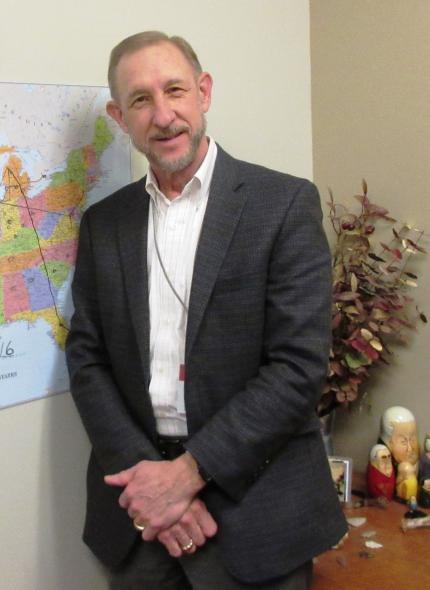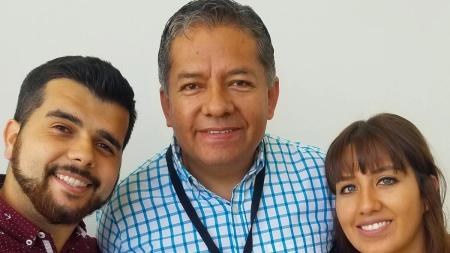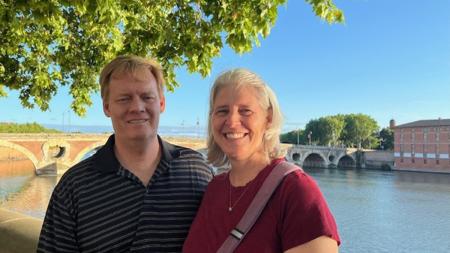CRC Chaplaincy Director to Retire

Ron Klimp
Chris Meehan
Rev. Ron Klimp said he has several strong memories that he will take with him when he retires in a few weeks after serving for seven years as the director of Chaplaincy and Care Ministry for the Christian Reformed Church.
There was the time, he said, that he got a tour of an aircraft carrier in Everett, Wash., and then the time he visited a hospital chaplain who had become a patient during the few days that he was visiting the area. “I had a chance to be a chaplain to him,” said Klimp.
Then there was the time Klimp was buying lunch from a food truck in the parking lot of a hospital and the server began praising the chaplain who worked at that hospital.
The chaplain had learned that the man’s mother had died, “and he had provided meaningful support through the funeral process,” Klimp recalled.
Klimp also remembers watching a young military chaplain lead a memorial service for his assigned battalion after one of their members committed suicide. “I was so impressed with his ability to be both frank and tender while helping a room full of young men and women process this painful reality.”
Also memorable, he said, was the experience of attending a national conference where representatives who endorsed chaplains for over 100 faith groups were present.
“I was surprised by how many of the people knew about the CRC because of the prominent positions and outstanding reputations of our chaplains,” said Klimp.
As he retires, these memories will blend with his other experiences over the years as the pastor of three churches and as one of the founders of a successful workplace chaplaincy program that began in northern Michigan before spreading to several states.
And, especially, there will be the satisfaction of being the director of CRC chaplains at a time when his office has seen increasing interest from pastors and seminary graduates to serve in the role.
“Chaplaincy as an outreach of the church has continued to accelerate. It was once an incidental outreach, but it is to the point that it isn’t incidental anymore,” said Klimp.
The ministry can no longer be viewed as a "small" ministry. If fact, he said, "it may have become, or soon may be, the largest and most cost-effective outreach ministry of the CRCNA."
The irony is that the church members may not see it, because the denomination doesn't pay for it.
"Almost all of these chaplains are employed by the agencies and institutions they serve, so they serve at very little cost to us,” he said
Meanwhile, Klimp added, the numbers of CRC chaplains keeps growing. “We used to endorse six to 10 new chaplains every year. In 2017, we endorsed four new people in January alone.”
Currently more than 150 CRC chaplains are endorsed to work in a range of settings from the military to hospitals and from nursing and hospice care facilities to workplaces and prisons. They also serve as clinical pastoral care supervisors and work in educational settings.
“Chaplaincy has continued to expand into new fields. And as it has expanded, more people have become aware of chaplains and their work — and the image of being a chaplain has become more positive,” said Klimp.
For example, an increasing number of Calvin Theological Seminary graduates are seeking to serve as chaplains.
Historically about 10 percent of seminary graduates have served as chaplains at some point in their career. But in the past five years, said Klimp, that number has been rising steadily for various reasons and is now approaching 15 percent.
Many of these now choose chaplaincy as a career track while in, or shortly after, seminary. Others are entering chaplaincy by way of the Commissioned Pastor route (which does not require a full MDiv degree, but some theological training).
“These are only rough numbers because it is hard to track, but the trend is certainly a line starting to significantly rise,” said Klimp.
Interest is growing in part because finding a job in a church is getting harder, but there is also the sense among seminary graduates and others that being a chaplain offers a special and fulfilling approach to ministry.
At the same time, said Klimp, chaplaincy itself is gaining a higher profile as standards increase and as health care facilities, the military, and other organizations express a growing need for trained chaplains.
“We see this need for pastoral care professionals to be working in crisis and post-crisis situations,” said Klimp. “As chaplains, we have to be willing to provide spiritual care without being sectarian. You are simply there to provide the care without discussing your own faith tradition unless you are asked.”
When reflecting on the role of chaplains, Klimp said he often thinks of how Jesus approached the Samaritan woman at the well (John 4). The woman, an outcast from her community because she had had several husbands and was then living with a man, was at the well at a time of day when other people had already drawn their water.
“Jesus goes to where she is and starts a conversation,” Klimp said. “He lets her lead the conversation. He doesn’t accuse her or try to convert her, and then she leaves — but she soon comes back over the hill with people from her community, wanting them to meet Christ.”
In his role, Klimp has organized an annual chaplain’s convention and assisted applicants in the endorsement process. He has also helped to encourage the use of a covenant (introduced by his predecessor) that a chaplain and his or her sending church sign as a bond, pledging to remain connected to one another.
Upon retiring, Klimp is planning to spend more time at his home in Cadillac, Mich., with his wife and family. He lives in the country and loves the outdoors, especially hunting.
“It’s been an exciting time to be a chaplain, because so much about it is changing and there are a lot of exciting reasons to be a chaplain in the future,” he said.


